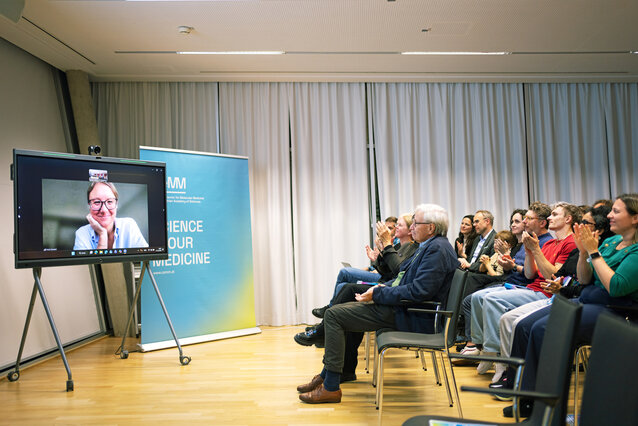Anais Elewaut wins 2025 Denise P. Barlow Award
Anais Elewaut, a recent PhD graduate from Anna Obenauf's lab at the IMP, was presented with the Denise P. Barlow Award for her exceptional doctoral research on some cancers’ ability to evade the immune system. The Barlow Award is given in memory of former IMP Group Leader Denise Barlow and a joint initiative of Vienna-based research institutions, chaired by the Center of Molecular Medicine (CeMM).
The Center of Molecular Medicine (CeMM) announced that the 2025 Denise P. Barlow Award is given to Anais Elewaut, a recent PhD graduate from the lab of Anna Obenauf at the IMP. Elewaut studied why T cell-based immunotherapies—which boost the immune system with engineered T cells trained specifically to combat cancer—achieve great results in some patients while unsuccessful in others. Her research showed how cancer cells modify their environment to dampen the immune response and ensure their survival. Elewaut’s groundbreaking PhD thesis now earned her the 2025 Denise P. Barlow Award.
Elewaut’s research showed that, contrary to textbook knowledge, a type of immune cells called inflammatory monocytes interact with cancer-killing T cells to form “inflammatory hubs”, where monocytes “cross-dress” with cancer proteins to boost T cell activity. This previously unknown step is important to maintain T cell function within tumours, and key to the effectiveness of cancer immunotherapies.
More importantly, Elewaut showed that, in some tumours, cancer cells can produce immune-regulating molecules that impair this interaction between monocytes and T cells, dampening T cell activity and evading the immune response. Based on these findings, Elewaut designed and tested new combined therapies that increase immunotherapy effectiveness in immune-evasive tumors, a ground-breaking step forward for cancer treatment.
About Anais Elewaut
Before joining the IMP, Elewaut completed her bachelor’s and master’s in biochemistry and biotechnology at Ghent University, Belgium, specialising in biomedical biotechnology. For her master’s thesis, she conducted research at the Centro de Investigaciones Biológicas Margarita Salas (CSIC), focusing on mechanisms that drive brain tumour growth. In 2018, she joined Anna Obenauf’s lab to investigate the mechanisms of cross-resistance to targeted and immunotherapies, aiming to better understand how cancer cells evade treatment. Elewaut defended her PhD thesis in December 2024 and recently joined the lab of Susan Kaech at the SALK Institute, where she studies immune resistance in glioblastoma.
Elewaut’s research was previously awarded the Egon Macher Award for young researchers by the German dermatological research association (ADF) and the Ritter von Managetta Award for Medicine 2024 of the Austrian Academy of Sciences (ÖAW).
About the Denise P. Barlow Award
Denise Barlow had a prolific scientific career, mostly remembered for her contributions to early epigenetics. A detailed account of the work she had done while starting her lab at the IMP can be found on this website. Barlow’s career, however, continued to span four institutions in Vienna: following the IMP, where she was a group leader, it also included the Max Perutz Labs, where she was a professor, IMBA, which provided laboratory space for some time, and CeMM, where she was a principal investigator until her retirement.
Following Barlow’s untimely passing in 2017, these four institutions launched an annual award in her name to merit exceptionally interesting PhD studies carried out in one of the four institutions. Specifically, the Denise P. Barlow Award intends to promote the academic career of young scientists, strategically addressing the transition of graduated PhD students to postdocs, by offering a small financial help that will alleviate the costs associated with relocation or career development.
The “Denise P. Barlow Award” amounts to 5,000 Euro. After two years of postdoc research, awardees are invited to give a talk, and while in Vienna, participate in the award of the next winner. The topic of the thesis can vary and cover basic cell biological, biochemical, molecular biological, structural, and computational work, with an emphasis on insight on new biological mechanisms, something Denise P. Barlow was fond of. The award selection committee comprises seven people, including the four scientific directors of the awarding institutes.
